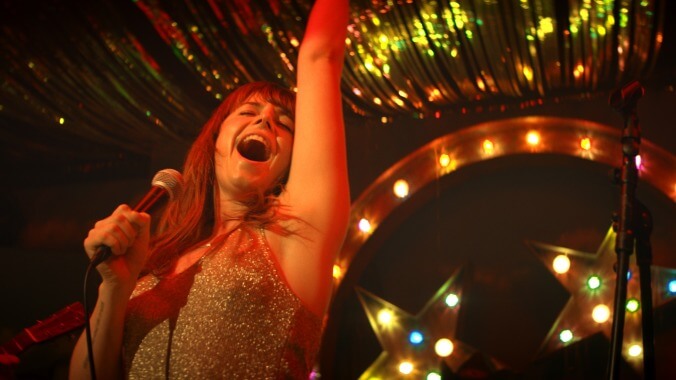A country-music star is born in the Scottish honky-tonk drama Wild Rose

Country music has a long history of brazen women doggedly persevering over daunting personal and societal odds. As far back as 1952, Kitty Wells shredded the hypocrisy of sexual double standards in her song “It Wasn’t God Who Made Honky Tonk Angels,” and Loretta Lynn had already given birth to three children when she taught herself to play the guitar in 1953, at the age of 21. Rose-Lynn (Jessie Buckley), the protagonist of Tom Harper’s new social-realist musical drama Wild Rose, has a life story that’s similar to those of her idols: She’s in her early 20s, fresh off of a 12-month prison sentence on drug charges, and trying—but mostly failing—to reconnect with her 8-year-old daughter and 5-year-old son. Her disapproving mother Marion (Julie Walters) wants Rose-Lynn to give up her dream of becoming a country (not “country and western”) singer. But to Rose-Lynn, country music is “three chords and the truth.” And you can’t deny the truth.
Further complicating Rose-Lynn’s situation is the fact that she was born in Glasgow, Scotland, a city that’s not exactly known for its thriving country-music scene. The film’s location comes with its own storytelling baggage, and Harper nods to the British kitchen-sink tradition by placing Rose-Lynn in drab concrete housing blocks with peeling paint and under the crushing facts of life as an ex-con and single mother. Chief among these is the intergenerational poverty that forced Marion to give up her dreams to go to work at age 15, and which makes Rose-Lynn’s ultimate goal of traveling to Nashville in search of her big break all but impossible. (The ankle bracelet doesn’t help.) It’s not until Rose-Lynn befriends Susannah (Sophie Okonedo), the wealthy woman whose house she cleans once a week, that she even dares to hope that things might actually work out for her in the music world. But will her attempt to hide her past from her employer comes back to bite her?
As a show-business fairytale, Wild Rose is pretty standard. But as a character study, it’s something special. That’s due largely to Buckley’s star-making performance as Rose-Lynn: Stomping through the streets of Glasgow in her white cowboy boots and white fringed leather jacket, she’s a raging cyclone of a woman who practically commands the eye to follow her across the screen—and that’s before she opens her mouth. Buckley originally made her name as a contestant on a BBC singing competition, and contributes not only her classically trained voice but also her songwriting skills as co-writer of the film’s original music with screenwriter Nicole Taylor. (She also collaborated with Mary Steenburgen on the stirring final number, “Glasgow.” Yes, that Mary Steenburgen). These are woven intoo a female-dominated country soundtrack that spans the decades from Kitty Wells to Kacey Musgraves, with pit stops at Lynne Anderson, Trisha Yearwood, Bonnie Raitt, and Wynonna Judd in between.
Buckley’s voice is like a sugar cube dissolving in a glass of whiskey, sweet enough to bring tears to your eyes with a throaty aftertaste that lingers after she’s belted out the last note. She pours plenty of emotion into the performance, too, provoking sympathy for Rose-Lynn’s confused and chaotic mental state, no matter how frustrating her impulsive behavior becomes. At one point in Wild Rose, Rose-Lynn’s family throws her a birthday party, and as she slumps disinterestedly over her homemade cake, her son asks if she made a wish. “You can have mine,” she replies, blankly. That this could be the chorus of a country song is no coincidence.